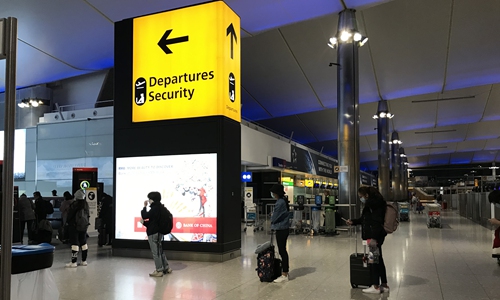Chinese students unfairly in Western cross hairs with red-baiting
By Shi Tian Source:Global Times Published: 2020/6/10 21:26:05

Passengers queue up for security checks before departing for Beijing, China, at London Heathrow Airport on March 28. Photo: Sun Wei/GT
Overseas Chinese students, once again, find themselves in the cross hairs of some Western politicians and media outlets.Tom Tugendhat, a senior British MP, on June 5 called for banning Chinese students being "used to empower state censorship." Reporting on his ideas, The Times noted that, "large numbers of Chinese students could be organised by the state to hijack democratic processes at universities."
Earlier, US news website Axios on May 26 played up a piece of "news" that took place almost four months ago, in which a student motion at the UK's University of Warwick to "support Hong Kong's movement and protect freedom of expression on campus" was voted down after Chinese mainland students' opposition, suggesting that the Chinese government was the hand under the table.
Such accusations are utter nonsense. Some in the West have long labeled overseas Chinese students as "agents of Beijing" and "puppets" who can be easily manipulated. To them, these young people studying abroad are a group of airheads without their own thoughts, judgments or emotions.
Whenever some Chinese say or do something inconsistent with the Western ideas, these politicians and media outlets tend to loudly shout, "They are brainwashed! They are manipulated by Communist China!"
But like every Westerner, each Chinese student is a flesh-and-blood individual perfectly capable of making their own decisions. A majority of Chinese, including those students at Warwick, are well aware of how Hong Kong has been ruined by some radical rioters. Their votes only reflected their own feelings - indignation at the rioters and hope for a better Hong Kong. Is there anything wrong with patriotism?
Living and studying outside their motherland, Chinese students usually have more accesses to the world and more objective perspectives in terms of China-related topics. What the West always advocates - independent thinking and freedom of speech - is also playing a positive role in this process. However, the West is seemingly denying these concepts pushed by itself. The Western style "freedom of expression" cannot even accept different voices.
It is absolutely normal and reasonable that various ideas regarding one particular event coexist. But the West is used to assuming that their values are the only righteous ones. They label those that hold different perspectives as "mouthpieces" of the Chinese government.
If any people are brainwashed, they might be some Westerners - they are brainwashed by their bias and arrogance. The UK was once one of the prime targets for Chinese students to study abroad. Its diverse and relaxed atmosphere of speech was precisely something that attracted young generations of Chinese. Now, the extreme remarks of politicians and the tendency to politicize education have resulted in the country's loss of its original appeal. Should all students be extremely cautious with their words on British campuses now? Is this what the UK government expects to see?
Chinese international student organizations, represented by the Chinese Students and Scholars Association (CSSA), are also seen by the West as "an instrument of interference," as quoted by The Times. The "campaign to defeat the motion" at Warwick was backed by the university's CSSA, it reported.
Apart from these recent reports by the British papers, as early as October 2018, US Vice President Mike Pence warned in a speech that CSSA members would "alert Chinese consulates and embassies when Chinese students, and American schools, stray from the Communist Party line."
A major piece of evidence cited by Western accusations is that the CSSA is "openly affiliated with the Chinese embassy." But the British Council, operated as the Cultural and Education Section of the British Embassy in Beijing, offers several study and work programs in China for British nationals. If having connections with embassies is problematic, how should these British students in China be identified? Are they pawns and puppets being used to "empower state censorship" or to "hijack democratic processes at universities?"
Western politicians and media outlets should abandon their double standards. They should stop using Chinese students to fabricate absurd stories and launch groundless attacks against China.
The author is a freelance writer based in Beijing. opinion@globaltimes.com.cn
Posted in: VIEWPOINT